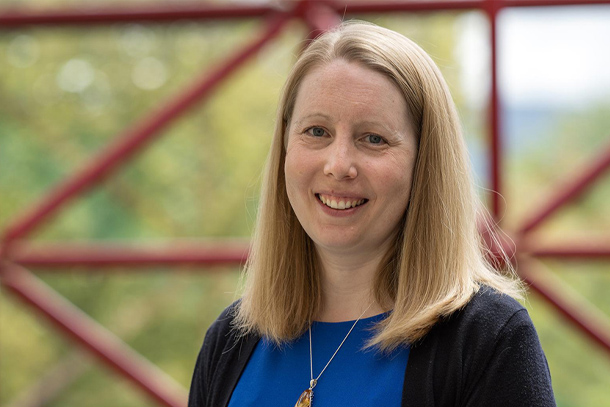
Jacqueline O'Connor. Credit: Photo provided. All Rights Reserved.
Jacqueline O’Connor named 2024 Penn State Teaching Fellow
March 26, 2024
Editor’s note: A version of this article originally appeared on Penn State News.
UNIVERSITY PARK, Pa. — Jacqueline O’Connor, professor of mechanical engineering in the College of Engineering, is one of three Penn State faculty this year to receive the Alumni/Student Award for Excellence in Teaching and be named a 2024 Penn State Teaching Fellow.
The Penn State Alumni Association, in conjunction with undergraduate and graduate governing bodies, established the award in 1988. It honors distinguished teaching and provides encouragement and incentive for excellence in teaching. Recipients are expected to share their talents and expertise with others throughout the University during the year following the award presentation.
O’Connor said her teaching philosophy has two goals: “Create a learning environment that encourages a diverse spectrum of students to become skillful scholars and provide students with meaningful educational experiences that train them to be high-impact engineers.”
To accomplish this, she relies on evidence-based strategies that are built on proven teaching and learning techniques. Part of her research delves into engineering education, so she’s up to date on methods that achieve the most success. Two current research projects of hers — both funded by seed grants from the Leonhard Center and the Schreyer Institute — have helped her fine tune those teaching goals and have improved her teaching outcomes, she said.
Engineering education research has given her a solid foundation in best practices while allowing her to chart her own path, developing new practices that improve her teaching and student outcomes.
“While I am a teacher first, the research lens has taken my educational innovation to the next level and supported my two teaching goals,” O’Connor said.
To create a learning environment that caters to a diverse group of learners, O’Connor starts by teaching the core material in a clear and engaging way through in-class assignments and homework that enhances what’s learned in class. The work is supported by readings, videos and quizzes.
After that, O’Connor pushes her students to apply what they’ve learned to higher-level concepts to help solve more complex engineering problems.
She and her research partner, Associate Research Professor Andrea Gregg, developed a model for improving conceptual learning called active learning and metacognition (ALM), which outlines a process by which students learn, use and reflect on concepts. To implement ALM, O’Connor creates structured activities and reflections that prompt students to not just think about the concepts, but to understand how those concepts can be used to address engineering challenges.
“These reflections are then used as the basis for further activities, allowing students to use their reflective practices to improve their problem-solving skills and develop deeper understanding of the material,” O’Connor said. “This methodology helps support learners from a wide variety of backgrounds to erase the ‘hidden curriculum’ of college and provide them skills in an up-front and supportive manner that will help them throughout college and their career ahead.”
O’Connor’s second goal — creating meaningful experiences that will make her students better engineers — is achieved through incorporating examples, case studies, real-life data, and enlisting the help of practicing engineers from relevant industries to bridge the gap between what they’re learning in the classroom to what they’ll do in their careers.
“This approach prepares students to be highly effective engineers after they graduate because they not only know the fundamentals but have seen those fundamentals applied in real-life contexts,” O’Connor said. “By putting together a solid understanding of the fundamentals, better metacognitive and problem-solving skills, and a broader appreciation of engineering contexts, students in my courses receive a high-impact engineering education.”
Former students said O’Connor is a passionate and effective educator with creative tools for learning. They said she offers a bridge between class discussions to what’s expected of them in the industry. They said, from the start, she is preparing them for futures in the field.
“Dr. O’Connor’s teaching has had a powerful influence in my professional life since the conclusion of my thermodynamics course. This past summer I had an internship with Constellation Energy at a nuclear power plant. The knowledge that I gained under Dr. O’Connor’s guidance greatly improved my ability to understand the thermodynamic cycle of the plant,” a former student said. “This led to me becoming a valued intern as I was put on more difficult projects than my peers. I am immensely grateful for the opportunity to study under Dr. O’Connor because of her passion for teaching, her personal commitment and her lasting impact.”



